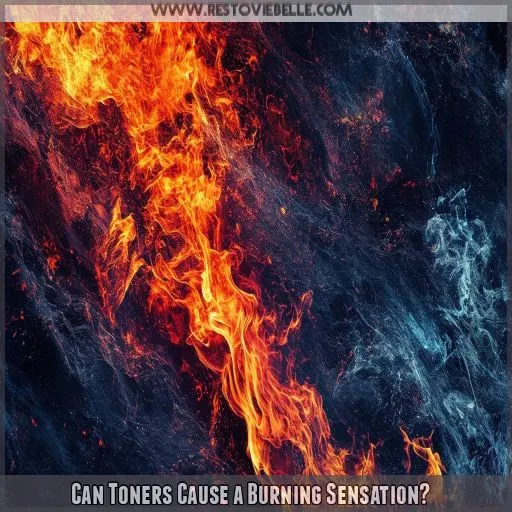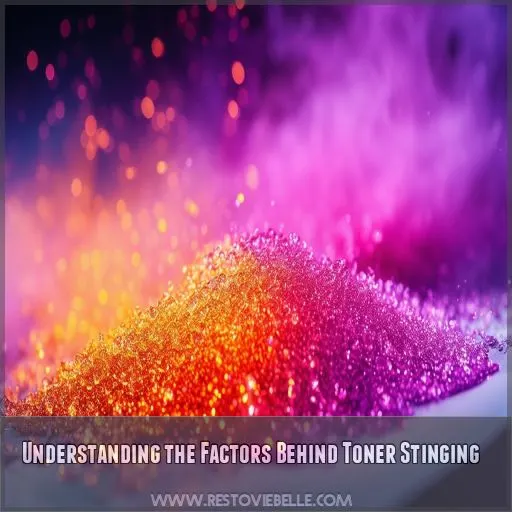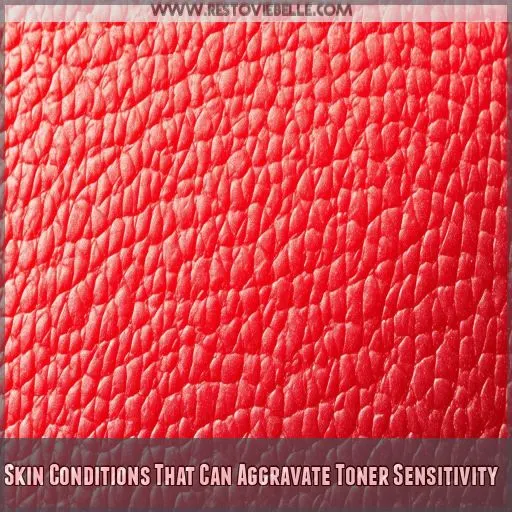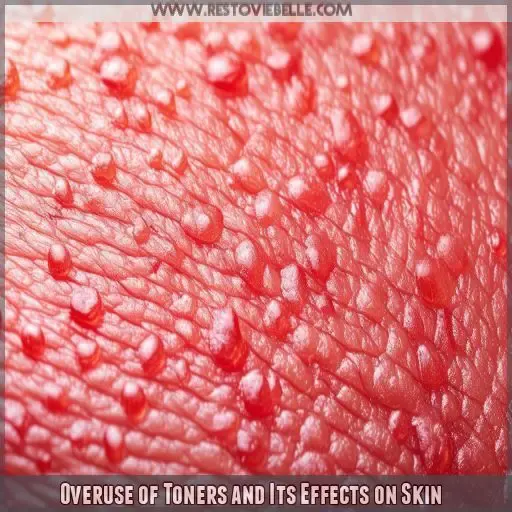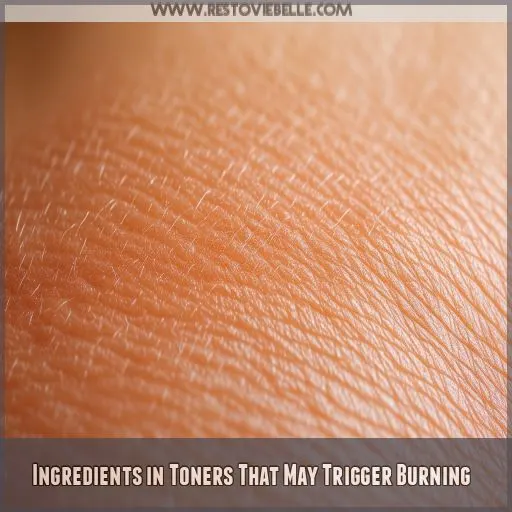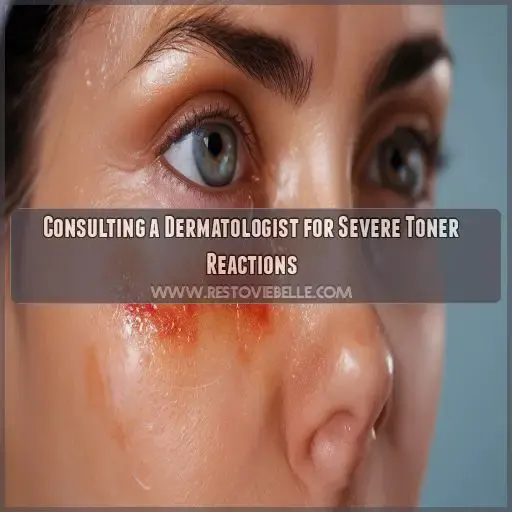This site is supported by our readers. We may earn a commission, at no cost to you, if you purchase through links.

We will discuss in this article what causes the skin to burn from a toner and its effects on your skin, coupled with some practical tips to avoid and soothe this irritation.
Table Of Contents
- Key Takeaways
- Is Toner Supposed to Burn?
- Can Toners Cause a Burning Sensation?
- Understanding the Factors Behind Toner Stinging
- Skin Conditions That Can Aggravate Toner Sensitivity
- Overuse of Toners and Its Effects on Skin
- Ingredients in Toners That May Trigger Burning
- How to Soothe and Heal Toner Burns
- Adjusting Your Skincare Routine to Prevent Toner Irritation
- Consulting a Dermatologist for Severe Toner Reactions
- Frequently Asked Questions (FAQs)
- Are toners supposed to sting?
- Is it normal for hair toner to burn?
- How do you get rid of toner burns?
- Can toner irritate skin?
- Can I apply toner directly with hands?
- Whats the best toner for combination skin?
- Should toners be used in the morning or night?
- How much toner should I use each time?
- Are there any toners safe for pregnant women?
- Conclusion
Key Takeaways
- Toner should never sting; if it does, it’s time to investigate the cause.
- Sensitive skin and certain ingredients can lead to toner burn, so patch test before applying a new toner.
- Overusing toner can damage your skin’s delicate balance, leading to dryness, irritation, and even acne.
- If you experience a severe toner reaction, don’t hesitate to seek professional help from a dermatologist for proper diagnosis and treatment.
Is Toner Supposed to Burn?
No, toner isn’t supposed to burn. If your skin stings, it might be reacting to certain ingredients like alcohol, fragrances, or acids. Sensitive or damaged skin can make this worse. Overuse of toner strips natural oils, causing irritation.
Always check the ingredients and conduct a patch test to avoid allergies. Use toner suited to your skin type, and limit application to once or twice daily. If burning persists, consult a dermatologist.
Want to know how to adjust your skincare routine for better results? Stick around.
Can Toners Cause a Burning Sensation?
Absolutely, toners can cause a burning sensation. It’s important to recognize that this isn’t normal and may indicate skin sensitivity.
Factors like your skin type and the product’s formulation play significant roles. If you experience burning, you might be dealing with a chemical burn from strong ingredients. Always do a patch test before applying a new toner to your face to identify potential issues.
Avoid toners that contain alcohol or harsh chemicals, as these are likely culprits. If your skin is sensitive or previously damaged, it’s more susceptible to such reactions.
Listen to your skin: if it burns, discontinue use immediately. Your goal should be to find a toner that soothes, not burns, your skin.
Understanding the Factors Behind Toner Stinging
If your toner is causing a burning sensation, it could be due to sensitivity to certain ingredients or an overly high acid content. Allergic reactions can also trigger this unpleasant reaction, so it’s important to pay attention to how your skin responds when using a new toner.
Sensitivity To Ingredients
When using toners, sensitivity to ingredients can cause stinging. Common culprits include alcohol, fragrances, and preservatives. To prevent irritation, consider:
- Ingredient Avoidance: Opt for gentle formulas.
- Patch Testing: Test the product on a small skin area first.
- Alternative Toners: Choose alcohol-free or natural options.
- DIY Toners: Create homemade toners with soothing ingredients.
High Acid Content
| High acid content in toners can cause a stinging sensation, particularly if your skin is sensitive or broken. Ingredients like lactic acid or AHA aim to exfoliate, but might be too harsh. | Skin Type | Acid Tolerance | Recommended Acids |
|---|---|---|---|
| Sensitive | Low | Low lactic acid | |
| Oily | High | Salicylic acid | |
| Dry | Medium | Glycolic acid |
Adjusting the acid level can prevent toner burn.
Allergic Reaction Indicators
An allergic reaction to toner ingredients can also trigger a burning sensation. Certain chemicals or fragrances may cause an allergic contact dermatitis, leading to pain, redness, and inflammation. If you experience a skin allergy after using a toner, discontinue use immediately and consult a dermatologist. Identifying and avoiding your personal allergic triggers is key to preventing toner-related irritation.
Skin Conditions That Can Aggravate Toner Sensitivity
Sensitive or broken skin can make you more susceptible to burning sensations from toner. Additionally, if you have an allergic reaction, your skin may become inflamed and more easily irritated by toner ingredients.
Sensitive or Broken Skin
Sensitive or broken skin can make you more susceptible to toner burns. If your skin’s pH balance is off, or you’re using harsh ingredients, irritation can flare up. Always check for suitable ingredients and proper usage. Maintain skin moisture to help protect sensitive areas. Avoid using toners on damaged skin as it can exacerbate discomfort.
Allergic Reactions
If you have an allergy to certain toner ingredients, your skin may react with severe burning, redness, and blistering. Perform a skin patch test before using a new toner to check for allergic reactions.
Avoid any problematic ingredients and switch to a gentler, natural toner formula.
Seek medical attention if the burning persists or worsens, as it could indicate a serious allergic response.
Overuse of Toners and Its Effects on Skin
Overuse of toner can severely affect your skin, leading to damage. Here are three main impacts to watch out for:
- Skin Damage: Excessive toner use can strip away natural oils, making your skin barrier weaker and prone to issues like dryness and cracks.
- Acne and Irritation: Constant application can result in clogged pores and acne flare-ups, alongside heightened irritation and redness.
- Dryness: Over-applying toner, especially those with alcohol, leads to significant dryness, making your skin feel tight and uncomfortable.
To avoid these problems, limit toner use to once or twice daily, and always choose formulations suited to your skin type. Balance is key to maintaining healthy, refreshed skin without unwanted side effects.
Ingredients in Toners That May Trigger Burning
Overuse of toners can leave your skin sensitive and more prone to discomfort. But what about the ingredients in toners that may trigger burning?
High alcohol content is a common culprit, as it can be quite irritating, especially on sensitive skin. Fragrances and essential oils, while often pleasant-smelling, can also be harsh and provoke irritation. When you ask, "Is toner supposed to burn?" remember, it’s these ingredients that often cause that unpleasant toner sting. It’s important to know the toner’s pH as well; an imbalanced pH can negatively affect your skin. Understanding these factors can help you choose gentler toner types and enjoy the full toner benefits without the sting.
How to Soothe and Heal Toner Burns
If you’ve experienced a burning sensation from using a toner, the first step is to stop using it immediately. The burning indicates your skin is irritated and needs soothing. To help heal the toner burn, try these remedies:
- Apply a cool, damp cloth to the affected area to reduce inflammation and provide relief.
- Use a gentle, fragrance-free moisturizer to hydrate and calm the skin.
- Incorporate anti-inflammatory ingredients like aloe vera or green tea into your routine.
- Avoid any other harsh skincare products until the burn has fully healed.
Recovery time can vary, but with the right aftercare, your skin should start to feel better within a few days. Be patient and gentle with your complexion – it’s important to let it heal before reintroducing toners or other potentially irritating products.
Adjusting Your Skincare Routine to Prevent Toner Irritation
To prevent toner irritation, examine your skincare routine carefully. Make sure you’re using a toner suitable for your skin type. Avoid acid exfoliants like glycolic acid or salicylic acid if your skin is particularly sensitive. Instead, choose toners with soothing ingredients like chamomile or aloe vera.
Ensure proper toner application—after cleansing, use a cotton ball or pad to lightly apply the toner. Don’t overuse; limit to once or twice a day. Check the toner’s pH level; a balanced toner won’t disrupt your skin’s natural barrier. Retinol or retinoids can also increase sensitivity, so use them sparingly or avoid them. Finally, consider gentle toner alternatives, like hydrating mists, to minimize irritation.
Consulting a Dermatologist for Severe Toner Reactions
If the toner reactions become severe, you should then see a dermatologist for effective solutions. Severe symptoms should be handled by an immediate visit to professional care offices to avoid long damage. This includes:
- Consult a dermatologist: Visit a dermatologist to get expert advice regarding your severe reaction to the toner, know the cause of the reaction, and get a tailored treatment plan.
- Sensitivity Tests: Request tests to identify the allergen/ingredient causing the reaction.
- Over-the-Counter Products and Prescriptions: Apply recommended over-the-counter products or prescribed medication to relieve the irritation.
- Emergency Interventions: For dire cases, such as severe allergies, you should have an epinephrine pen within your reach, and know when to call for an ambulance.
Frequently Asked Questions (FAQs)
Are toners supposed to sting?
You might feel a slight tingle when using toner, but it shouldn’t sting. If it burns, something’s wrong—perhaps an allergy, high acid content, or sensitive skin. Discontinue use immediately and consult a dermatologist.
Is it normal for hair toner to burn?
If your toner is causing a burning sensation, that’s not normal. Discontinue use immediately, as it may indicate skin sensitivity or an allergic reaction. Consult a dermatologist to find a gentler toner suited for your skin type.
How do you get rid of toner burns?
If your toner burns, stop using it immediately. Rinse your face with cool water, apply a soothing moisturizer, and use a higher SPF. Look for a toner with a lower pH and gentler ingredients.
Can toner irritate skin?
Yes, toner can irritate skin. If you experience burning, stinging, or redness, you might’ve sensitive skin or an allergy to ingredients. Always discontinue use if irritation occurs and consult with a dermatologist.
Can I apply toner directly with hands?
Ah, the age-old question – can you apply toner directly with your hands? Well, my friend, that would be like trying to catch lightning in a bottle. Stick to cotton pads for best results.
Whats the best toner for combination skin?
For combination skin, use a toner with glycolic acid or niacinamide to balance oil and hydrate dry areas. Good Molecules Niacinamide Brightening Toner is an excellent choice, offering balanced care for varied skin needs.
Should toners be used in the morning or night?
Toners can be used both morning and night. In the morning, they refresh and prepare your skin for the day. At night, they cleanse and balance your skin after removing makeup and impurities collected throughout the day.
How much toner should I use each time?
Use just a few drops of toner on a cotton pad and gently sweep it across your face. Avoid over-applying, as too much toner can dry out your skin. Adjust the amount based on your skin’s needs.
Are there any toners safe for pregnant women?
Imagine your skin being pampered and refreshed. Gentle ingredients in toners, including chamomile or aloe vera, are perfectly safe to apply as a pregnant woman. Absolutely not high in alcohol content and harsh chemicals, if the skin is to be healthy and not irritated.
Conclusion
Toners can be a double-edged sword in your skincare routine. If you’re wondering, "Is toner supposed to burn?"—the answer is generally no. Factors like sensitive skin, ingredient sensitivity, and overuse can cause stinging.
Identify ingredients or practices that irritate, and adjust accordingly. Always soothe and protect your skin to prevent burns.
When in doubt, consult a dermatologist for severe reactions. Prioritize understanding your skin and refine your routine for a healthier complexion.

